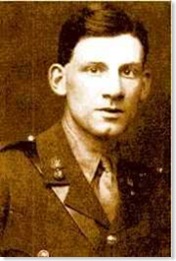Since I mentioned Siegfried Sassoon in the last post as a kind of “anti-Flanders” poet, it’s only right I post a poem.
Survivors
No doubt they’ll soon get well;
the shock and strain
Have caused their stammering, disconnected talk.
Of course they’re ‘longing to go out again,’ —
These boys with old, scared faces, learning to walk.
They’ll soon forget their haunted nights;
their cowed Subjection to the ghosts of friends who died,—
Their dreams that drip with murder; and they’ll be proud
Of glorious war that shatter’d all their pride…
Men who went out to battle, grim and glad;
Children, with eyes that hate you, broken and mad.
 Soaked in sarcasm…but he did have the right.
Soaked in sarcasm…but he did have the right.
He was full of heady idealism when he enlisted at the outbreak of the first world war. And his early poetry pictures war as a noble enterprise. But when he got to the front, got to the trenches, saw the limbs and smelled the stench of violent death, and when his comrades and some of his family became casualties, he began to examine his adopted idealism and his poetry turned from a romanticization of the war to its portrayal in language with razor-edge reality.
His friend, Robert Nichols, another poet and soldier, quotes him as follows:
“Let no one ever, from henceforth say one word in any way countenancing war. It is dangerous even to speak of how here and there the individual may gain some hardship of soul by it. For war is hell, and those who institute it are criminals. Were there even anything to say for it, it should not be said; for its spiritual disasters far outweigh any of its advantages.”

Why is it that those who never actually face the ‘reality of war’ feel they have the right to pass judgment on those who have experienced it and want to speak out against it – example: calling those men/women traitors who speak against it once they have lived through it? Shouldn’t we instead listen and learn…?
Something’s wrong when we consider those in leadership (just because they are in leadership) the ‘experts’ over and against those who have actually experienced it – whatever ‘it’ might be. This is very anti-narrative. Am I right Sam? And I believe it is very destructive to a society.
With that thought regarding leadership listening to the people with the experience:
Why is it that Christians who claim that Jesus is their leader, in fact God himself, seem to rarely practice the teachings of that leader? Example: giving up power in order to lead rather than claiming and demanding power, listening to people rather than ‘shutting their ears’ to them. Loving others as one’s self…